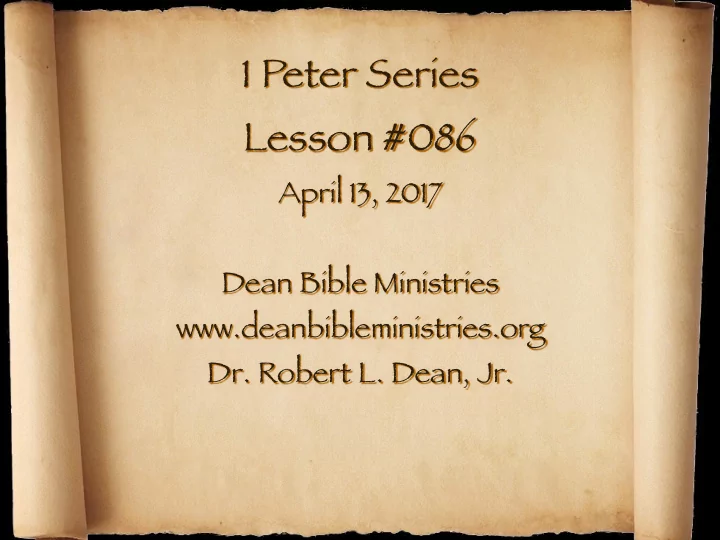

1 Peter Series Lesson #086 April 13, 2017 Dean Bible Ministries www.deanbibleministries.org Dr. Robert L. Dean, Jr.
G IVING AN A NSWER – P ART 4 O LD T ESTAMENT B IBLICAL E XAMPLES 1 P ETER 3:15
Introduction to Apologetics 1. What is Apologetics ? 2. Why should we learn about apologetics? 3. Why do some people object to apologetics? 4. The Bible doesn’t use apologetics, why should we? 5. What is the difference between Apologetics and Christian Evidences? 6. On what basis do we defend, support, argue, that Christianity is the one and only TRUTH?
1. What is Apologetics ? aÓpologi÷a apologia ① a speech of defense, defense, reply ② the act of making a defense, defense; as in court, or an eager activity to defend oneself, 2 Cor. 7:11 ③ claim of extenuating circumstance excuse, BAGD “17 × the noun or verb appears in the New Testament with the sense of either vindication or defense in every use. (Boa, Faith has its Reasons )
“ Apologia describes a carefully reasoned defense in response to a line of questioning or wrongful accusation by recognized authorities. The word may also refer to a more informal defense outside of the courtroom against personal questioning or accusation (1 Cor. 9:3; 2 Cor. 7:11; 1 Pet. 3:15). The intent of an apologia is to win over the person being addressed, to change his mind about what is true.” ~Clough, Theology and Apologetics
Introduction to Apologetics 1. What is Apologetics ? 2. Why should we learn about apologetics?
2. Why should we learn about apologetics? a. Because it is commanded in Scripture! Titus 1:9, “holding fast the faithful word as he has been taught, that he may be able, by sound doctrine, both to exhort and convict those who contradict.”
2. Why should we learn about apologetics? b. Because it strengthens our own understanding of what we believe and builds our confidence in God, the gospel, the Scripture, and Jesus.
2. Why should we learn about apologetics? c. It advances us spiritually. 2 Cor. 10:4, “For the weapons of our warfare are not carnal but mighty in God for pulling down strongholds, 2 Cor. 10:5, “casting down arguments and every high thing that exalts itself against the knowledge of God, bringing every thought into captivity to the obedience of Christ,”
Introduction to Apologetics 1. What is Apologetics ? 2. Why should we learn about apologetics? 3. Why do some people object to apologetics? Some do not find it in the Bible.
Four Basic Issues in Apologetics 1. How do we know anything? Do we know things as they are or only as we perceive them? Is truth knowable absolutely or only probabilities, or only perceptions? 2. Do the theistic proofs actually prove anything? 3. What is the role of evidences in apologetics? 4. Is there a common ground between Christian thought (DVP) and non-Christian thought (HVP)? If so, what is it?
The Basis of Knowledge SYSTEM STARTING POINT METHOD Autonomous Systems Innate ideas RATIONALISM Independent use Faith in human Classic of logic & reason of Perception Apologetics- ability. Logic and reason Sense perceptions EMPIRICISM Independent use External experience; of logic & reason Evidentialism- Scientific method; Facts, history, Faith in human ability science Independent, MYSTICISM Inner, private experience; intuition nonlogical, Fideism-just Faith in human ability nonrational, believe, apart from nonverifiable reason or evidence Viewpoint REVELATION Objective Dependent use of Divine revelation of God logic & reason Presuppositionalism- Presupposes the truth of Scripture
Revelational Common ground: Infallible General and Special Revelation; convicting work of the Holy Spirit. Rational and empirical approaches give too much credit to unaided human ability. Focus should be on exposing inadequate presuppositions and that only the Bible provides a valid basis for reason, history, fact, and truth. Key people: John Calvin, Abraham Kuyper, Cornelius Van Til, and Francis Schaeffer to some degree.
Revelational What is their common ground? Infallible Truth of Special Revelation The unbeliever is in the image of God and knows God exists, and Pagan Christian that he is a sinner. aborigines; Missionary Your neighbor God HS convincing them of the truth
This is where Application we talk and Political/National or argue. Individual Decisions e Ethics: What is right? What P c r n e is wrong? What is good or e s u s bad? q u e r Epistemology: How do we S e s l know truth? Right from a o c f wrong? Just or unjust? i g L o i f Metaphysics: Ultimate reality, L e These are i.e., God, matter, energy, the real nothing issues, Foundation of all thought usually ignored.
Introduction to Apologetics 1. What is Apologetics ? 2. Why should we learn about apologetics? 3. Why do some people object to apologetics? 4. The Bible doesn’t use apologetics, why should we?
DVP vs. HVP Common Ground Triune GOD Is the common ground Ancient humans apart from God or is it the Adam and Eve Creator–God who made man in His image?
Examples: Gen. 1:1–2:4: The Creation account directly challenges all HVP ideas of origins.
Chain of Being Being Emanating from “god” “god” Being or raw Angelic or spirit beings existence itself Human beings Animals Vegetation Non- Rocks, dirt, water Being Astronomical & geophysical environment (incl. climate)
Pagan (HVP) GOD Ideas Personal-Infinite God/gods Pure FINITE UNIVERSE Being Angels Demons Man Animals Man Vegetation Animals Matter/Energy Non-Being Nature
Jesus and the apostles accepted the historicity of the Genesis narrative. Matt. 19:4; 5 quotes from Gen. 1, then Gen 2. Noah: Matt. 24:37–38; Heb. 11:7; 1 Pet. 3:20; 2 Pet. 2:5. Rom. 5:14ff; Death reigned from Adam to Moses. 1 Cor. 11:9; the woman created for the man. 1 Cor. 15:22; in Adam all die. 1 Tim. 2:13–14; Adam was formed first, then Eve. Jude 14; Enoch the seventh from Adam. Rev. 4:11; You created all things.
Recommend
More recommend